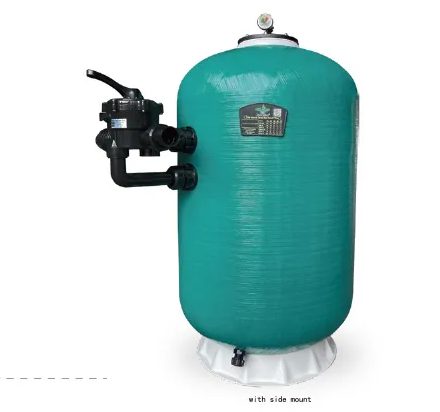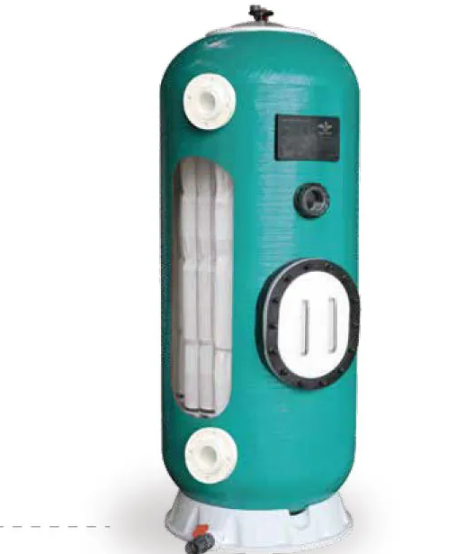Running a commercial swimming pool is no small feat. Ensuring your pool stays clean and safe for users is a top priority, which can only be possible by selecting the right filtration system. With various options available, it can be overwhelming to make the right choice. In this blog post, we will guide you through the process of choosing the perfect swimming pool filter for your commercial pool.
Poolking, your best swimming pool equipment manufacturer and supplier with more than 20 years experience. ![]() Email: sandy@poolking.co
Email: sandy@poolking.co
How to Choose Swimming Pool Filter for Commercial Swimming Pools?
2023-10-17
Importance of Filtration in Commercial Swimming Pools
Before learning about the specifics of filtration systems, let’s first understand why they are so crucial for commercial pools. Its first and foremost role is to maintain water clarity. This guarantees that the pool water remains crystal clear and is visually appealing for swimmers. This clarity enhances the overall aesthetics of the pool and provides a positive customer experience.
Secondly, filtration is essential for removing contaminants from the water, such as dirt, debris and microorganisms. As commercial pools face significant traffic of people coming from different places, it is crucial for management to keep them sanitized and dirt-free. Without effective filtration, these impurities can accumulate, leading to cloudy, unsanitary water that poses health risks to swimmers.
Additionally, proper filtration promotes water circulation and helps distribute pool chemicals evenly. This ensures that sanitizers and disinfectants are effective in maintaining water quality and preventing the growth of harmful bacteria.
Factors to Consider When Choosing Commercial Pool Filters
Now, let's focus on the fundamental question: how to choose commercial pool filter systems?
1. Pool Size and Capacity
The first step in selecting a filtration system is to consider the size and capacity of your commercial pool. Government entities such as municipalities and schools also maintain public pools. These pools are 10 times bigger than private pools. For example, swimming pools in schools are typically 50 meters long and 23 meters wide. So, for these pools you need to find a robust pool filter that is capable of maintaining large volume of water quality.
The Poolking Fiberglass Topmount Sand Filter and the Fiberglass Sidemount Deep Bed Sand Filter are two excellent options for different pool sizes. If you manage a larger and more prestigious Five-Star Pool, the Fiberglass Sidemount Deep Bed Sand Filter can handle the increased capacity while maintaining superior filtration performance.

2. Filtration Capacity
The system's ability to filter is a crucial consideration. This capacity is frequently expressed in gallons per minute (GPM). To guarantee that your pool's water is adequately filtered, you will need a commercial pool filter with a capacity appropriate for your pool's water flow rate.
Confirm that the filtration system you select can handle the water volume in your pool effectively. Swimming pool filtration systems can typically remove particles as small as 3 to 50 millimeters. Despite how little it may seem, the difference between a solution's ability to filter down 3 microns or 50 microns is significant.
3. Filtration Media
Filtration systems use different media types to trap and remove impurities from the water. The most common options include pool sand filter, cartridge and diatomaceous earth or DE pool filter. Each has its advantages:
§ Pool sand filters effectively capture larger particles and are suitable for pools with moderate to heavy debris.
§ A cartridge filter offers finer filtration and requires less water for cleaning. They are an excellent choice for pools with minimal debris and those looking for energy efficiency.
§ DE pool filters provide the finest level of filtration and are suitable for pools that demand the highest water clarity, such as Olympic-sized pools.
Which one is best for commercial swimming pools? A DE pool filter provides the most powerful filtration capabilities, capturing particles as fine as 5 microns. DE filters give the best water quality for your pool, but they are the most expensive and time-consuming pool filters on the market.
If you are looking for a reliable DE pool filter, view Pool King’s extensive range of diatomaceous earth filters for commercial pools.

4. Maintenance Requirements
Maintenance is an ongoing aspect of pool ownership. Different filtration systems have varying maintenance requirements. A sand filter, for example, is relatively low-maintenance but requires occasional backwashing to clean the filter media. Cartridge filters need regular cleaning and replacement of cartridges, while DE filters demand careful handling of diatomaceous earth powder. Choose a system that aligns with your maintenance capabilities and budget.
5. Energy Efficiency
Energy costs can significantly impact your pool's operating expenses. So, it is vital to consider the energy efficiency of the filtration system you prefer. Some systems are designed to minimize energy consumption while maintaining effective filtration. Look for energy-efficient models that can support you save on utility bills in the long run.
6. Warranty and Manufacturer Support
Always check the manufacturer's warranty and reputation when purchasing a filtration system. A reliable warranty confirms that you have protection against defects and a reputable manufacturer will provide dependable customer support if you encounter any issues.
7. Water Flow Rate
The water flow rate of a filtration system is crucial to its effectiveness. It determines how quickly the entire volume of pool water can pass through the filter, guaranteeing thorough filtration. When selecting a filtration system, match its flow rate with your pool's circulation pump capacity. An inadequate flow rate can result in incomplete filtration, while an excessive flow rate may cause unnecessary strain on the system and lead to higher energy consumption.
Therefore, choosing a filtration system with the appropriate flow rate for your pool's size and circulation system is essential for optimal performance.
8. Environmental Impact
Look for a swimming pool filter that is designed with sustainability in mind. Some modern commercial pool filters incorporate features like variable-speed pumps and eco-friendly filter media to reduce energy consumption and minimize the use of chemicals. Choosing an environmentally friendly filtration system not only benefits the planet but can also lead to cost savings through reduced energy and chemical usage over time.
Additionally, some regions may have regulations regarding pool equipment's environmental impact, so it is essential to stay compliant with local guidelines.
Conclusion
Selecting the right filtration system for your commercial swimming pool is a crucial decision that affects water quality, maintenance and overall operational costs. That is because filtration in commercial pools is indispensable for water clarity, cleanliness, sanitation and the overall safety and satisfaction of pool-goers. It is a fundamental component of pool maintenance, adding to the facility's durability and success. With our commercial pool filters guide, we hope you will be able to make the right decision.
Related articles
Tips for Extending the Lifespan of Your Pool Sand Filter
Top Benefits of Pool Sand Filters
8 Ways To Improve Your Swimming Pool Filtration
ReviewsNumber of comments: {{ page.total }}
I want to comment?
{{item.nickname ? (item.nickname.slice(0, 2) + '*****') : item.source === 1 ? 'mall buyer' : '--'}}
{{item.comment_time}}
Review in the {{item.country}}
Reviews
Merchant
{{replyItem.nickname ? (replyItem.nickname.slice(0, 2) + '*****') : replyItem.source === 1 ? 'mall buyer' : '--'}}
{{replyItem.parent_nickname ? (replyItem.parent_nickname.slice(0, 2) + '*****') : '--'}}
{{replyItem.is_merchant_reply === 1 ? replyItem.reply_time : replyItem.comment_time}}
Review in the {{replyItem.country}}
Reviews

No customer reviews
recommended for you
no data
Get in touch with us
PRODUCTS
QUICK LINKS
If you have any question,please contact us.
Contact: Sandy
Email: sandy@poolking.co
Sales Hot line: +86-20-34982303
WhatsApp:+86-13922334815
Add: No. 80, Danan North Road, Dagang Village, Dagang Town, Nansha District, Guangzhou City (temporary business premises)
Language
Copyright © 2026 Guangdong Poolking filtration equipment manufacturing co. Ltd. - www.poolking.co All Rights Reserved. | Sitemap


























